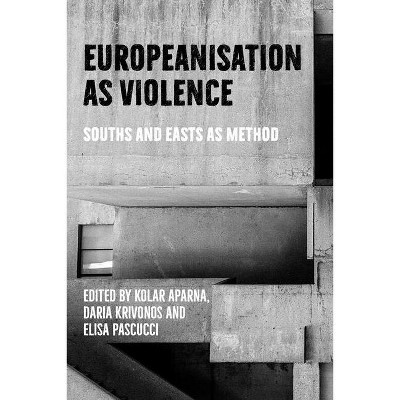$36.95 when purchased online
Target Online store #3991
About this item
Highlights
- This book provides a comprehensive examination of conservative and right-wing responses to the Edwardian crisis in Britain (1901-1914).
- About the Author: Alessandro Saluppo is an Adjunct Professor of History at Fordham University, New York.
- 336 Pages
- History, Europe
Description
About the Book
This book offers a novel interpretation of conservative and right-wing responses to the Edwardian crisis in Britain (1901-1914).
Book Synopsis
This book provides a comprehensive examination of conservative and right-wing responses to the Edwardian crisis in Britain (1901-1914). It stresses how the upsurge of right-wing extremism within and outside the Conservative party was accompanied by the crystallization of a culture of violence. The preparation, instigation or threatening of violent acts against all those who appeared to threaten the organic nature and vigour of the national community found expression in a myriad of ultra-nationalist organisations, citizen policing groups, private military associations, and paramilitary formations. The book innovatively reconstructs the belief system and the practices of those right-wing actors, which pursued the goals of military preparedness, "racial regeneration" and imperial unity, while defending the amorphous goals of authority, order and 'national efficiency' against the forces of radicalism and socialism. The book helps to cast light on the bellicose and authoritarian reflexes that traversed British conservatism in the turbulent prewar years.From the Back Cover
The book examines how the British Right responded to the challenges of democratisation and, more generally, to the national crisis of confidence that permeated the Edwardian years (1901-1914). It explores the mobilization of a variety of different nationalist organisations, citizen policing groups, private military associations and paramilitary formations, which conferred on themselves the right to protect Britain from its internal and external enemies.
Academic historians have examined this surge of right-wing extremism within and outside the Tory Party in the prewar years. However, they often overlooked how this 'rebellion on the right' produced a culture of violence in the most reactionary and intransigent sectors of British conservatism. Drawing on a vast array of documentary sources, the book explores the distinctive kind of belief system and the practices of those right-wing actors, which variously pursued the goals of military preparedness, 'racial regeneration' and imperial unity. While differing in their primary aims, they were all guided by the principle that all citizens owed a duty of service to the country and had the right to endorse any movement believed to be beneficial to the nation and its interests. The book reveals their proclivity for violent means to suppress any type of political, social or cultural deviance that might imperil the organic nature and vigour of the national community. The book is of special interest to historians and other scholarly researchers in that it brings back into focus a largely forgotten network of organisations bound together by deep fears of national decadence and social disintegration. At the same time, it helps shed light on those powerful tensions and authoritarian reflexes which traversed conservative imaginaries in the volatile Edwardian days.About the Author
Alessandro Saluppo is an Adjunct Professor of History at Fordham University, New York.Dimensions (Overall): 9.21 Inches (H) x 6.14 Inches (W) x .75 Inches (D)
Weight: 1.41 Pounds
Suggested Age: 22 Years and Up
Number of Pages: 336
Genre: History
Sub-Genre: Europe
Publisher: Manchester University Press
Theme: Great Britain, 20th Century
Format: Hardcover
Author: Alessandro Saluppo
Language: English
Street Date: November 4, 2025
TCIN: 1002787269
UPC: 9781526164872
Item Number (DPCI): 247-37-7305
Origin: Made in the USA or Imported
Shipping details
Estimated ship dimensions: 0.75 inches length x 6.14 inches width x 9.21 inches height
Estimated ship weight: 1.41 pounds
We regret that this item cannot be shipped to PO Boxes.
This item cannot be shipped to the following locations: American Samoa (see also separate entry under AS), Guam (see also separate entry under GU), Northern Mariana Islands, Puerto Rico (see also separate entry under PR), United States Minor Outlying Islands, Virgin Islands, U.S., APO/FPO
Return details
This item can be returned to any Target store or Target.com.
This item must be returned within 90 days of the date it was purchased in store, shipped, delivered by a Shipt shopper, or made ready for pickup.
See the return policy for complete information.












